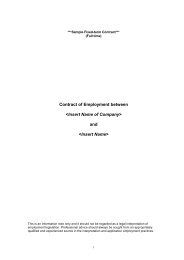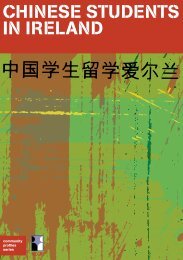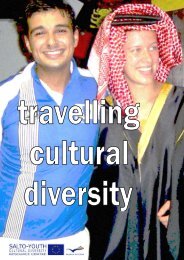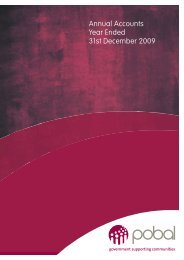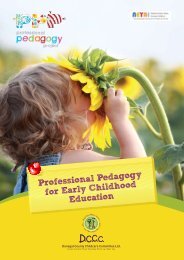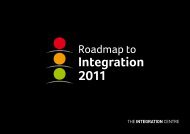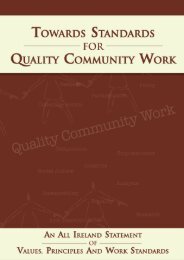Intercultural Education in the Post-Primary School - National Council ...
Intercultural Education in the Post-Primary School - National Council ...
Intercultural Education in the Post-Primary School - National Council ...
Create successful ePaper yourself
Turn your PDF publications into a flip-book with our unique Google optimized e-Paper software.
• provid<strong>in</strong>g <strong>in</strong>formation to parents <strong>in</strong> away which takes account of <strong>the</strong> existenceof a diversity of literacy levels as well ascultural and l<strong>in</strong>guistic diversity. Forexample, parent-teacher meet<strong>in</strong>gs, schoolhandbook, <strong>in</strong>vit<strong>in</strong>g parents <strong>in</strong> to <strong>the</strong>school for special events• provid<strong>in</strong>g opportunities for <strong>in</strong>formalmeet<strong>in</strong>gs of staff and parents andestablish<strong>in</strong>g parent—teacher contact thatoffers opportunities to discuss andunderstand each o<strong>the</strong>r’s po<strong>in</strong>ts of view• address<strong>in</strong>g parental fears and concerns• <strong>in</strong>vit<strong>in</strong>g parents to become <strong>in</strong>volved <strong>in</strong>extra-curricular activities or <strong>in</strong>terculturalevents• identify<strong>in</strong>g opportunities where parentsand o<strong>the</strong>r members of <strong>the</strong> community cansupport <strong>the</strong> school, for example, languagesupport, translation, homework clubs• develop<strong>in</strong>g strategies to <strong>in</strong>volve <strong>the</strong> widercommunity <strong>in</strong> an <strong>in</strong>tercultural approach,for example, <strong>in</strong>vit<strong>in</strong>g <strong>in</strong>dividuals orcommunity groups that may have aparticular area of expertise.SCHOOL PLANNING FOR AN INTERCULTURALSCHOOL<strong>School</strong> plann<strong>in</strong>g for an <strong>in</strong>tercultural schoolcan be <strong>in</strong>corporated <strong>in</strong>to school plann<strong>in</strong>gwork which is be<strong>in</strong>g started <strong>in</strong> schools or isalready underway. Each school communitywill be at a different stage <strong>in</strong> <strong>the</strong> schooldevelopment plann<strong>in</strong>g process and will alsohave different conceptions of <strong>the</strong> mostappropriate way of develop<strong>in</strong>g an <strong>in</strong>clusiveand <strong>in</strong>tercultural school. These differenceswill affect <strong>the</strong> way <strong>in</strong> which each schoolcommunity engages <strong>in</strong> <strong>the</strong> plann<strong>in</strong>g process.In <strong>the</strong> Department of <strong>Education</strong> andScience’s <strong>School</strong> Plann<strong>in</strong>g: Develop<strong>in</strong>g a<strong>School</strong> Plan-Guidel<strong>in</strong>es for Second Level<strong>School</strong>s, it is suggested that <strong>the</strong>re are fourma<strong>in</strong> stages that might be considered byschools: review of current practice andprovision, design of a plan, implementationand evaluation. These stages form acyclical process, which cont<strong>in</strong>uallyunderp<strong>in</strong> <strong>the</strong> work of <strong>the</strong> school. Fur<strong>the</strong>rdetails on <strong>the</strong> review, design,implementation and evaluation process canbe accessed <strong>in</strong> <strong>the</strong> support materialsprovided by <strong>the</strong> <strong>School</strong> DevelopmentPlann<strong>in</strong>g Initiative (www.sdpi.ie).There are many approaches to schooldevelopment plann<strong>in</strong>g and it is importantthat <strong>the</strong> school community adopts anapproach that suits its particular situation.However, sometimes it can be difficult toknow where to start. The follow<strong>in</strong>gguidel<strong>in</strong>es may give some ideas about howa school might <strong>in</strong>clude an <strong>in</strong>terculturalperspective <strong>in</strong> school plann<strong>in</strong>g.The plann<strong>in</strong>g process should assist all <strong>the</strong>members of <strong>the</strong> school community <strong>in</strong>develop<strong>in</strong>g an <strong>in</strong>clusive and <strong>in</strong>terculturalschool that addresses <strong>the</strong> needs of all itsstudents. The plann<strong>in</strong>g process should<strong>in</strong>clude <strong>the</strong> follow<strong>in</strong>g:• conduct<strong>in</strong>g an <strong>in</strong>tercultural schoolreview• <strong>in</strong>clud<strong>in</strong>g an <strong>in</strong>tercultural awareness <strong>in</strong><strong>the</strong> school mission, policy and actionplan• implement<strong>in</strong>g <strong>the</strong> school plan• monitor<strong>in</strong>g and evaluat<strong>in</strong>g <strong>the</strong> actionplan.The school reviewAs an <strong>in</strong>itial step <strong>in</strong> <strong>the</strong> plann<strong>in</strong>g process itis useful to engage <strong>in</strong> a review of where <strong>the</strong>school is positioned at <strong>the</strong> moment <strong>in</strong>relation to be<strong>in</strong>g <strong>in</strong>clusive and<strong>in</strong>tercultural. To this end <strong>the</strong> schoolcommunity could engage <strong>in</strong> an<strong>in</strong>tercultural school review. The <strong>School</strong>Review Checklist (Figure 2) could be usedas a model for plann<strong>in</strong>g this review.24<strong>Intercultural</strong> <strong>Education</strong> <strong>in</strong> <strong>the</strong> <strong>Post</strong>-<strong>Primary</strong> <strong>School</strong>






